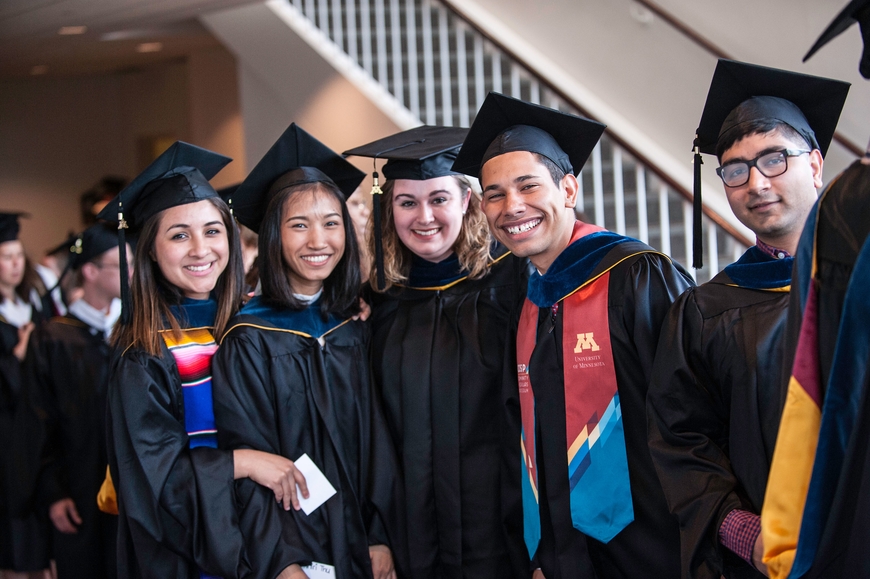Equity & Diversity

The Human Rights Program at the University of Minnesota seeks to encourage diverse student and faculty voices, promote inclusion of all people in our programs and events, and continually reflect on how we can better ensure equity across our program. We define “diversity” broadly, and strive to invite people of different races and ethnicities, socioeconomic backgrounds, home countries, genders, sexualities, faiths, ages, and abilities to engage with human rights scholarship and advancement of human rights protections.
In our pursuit of creating an inclusive and equitable community for all and engaging with a diverse array of ideas, the Human Rights Program has taken a variety of steps to infuse every aspect of the program with these values, and has ongoing discussions on how to expand further. We welcome suggestions or opportunities for discussion on how we can increase, improve, or further enhance the equity of our programs. Below are some of the areas that highlight our commitment to equity and diversity.
Faculty and Students
We are proud of the array of experiences that our faculty brings to the Human Rights Program, both for our undergraduate students who focus on human rights, students who do our graduate minor in human rights, and for our Master of Human Rights students. Faculty who teach human rights courses challenge students to expand their thinking on what “inclusion” or “equity” means, problematize and discuss solutions to human rights rhetoric and methods, and be open to opinions or worldviews different from their own. Faculty address issues of agency, voice, and representation in their classroom discussions and research design. Students are encouraged to consider the tension between various human rights that we study, such as non-discrimination and self-determination, and to serve as leading thinkers and actors in relation to complex ideas inherent to human rights, such as fairness, equality, justice and truth.
Current and former Human Rights undergraduate and graduate students are diverse, not just in their identities, but also in their previous experiences and areas of focus. The Master of Human Rights Program, including the Human Rights Graduate Minors, specifically seeks to recruit students with varied backgrounds, identities, experiences, and areas of expertise or interest. Among our former and current students, we have scholars from across the United States including Puerto Rico. We also have scholars from a variety of countries including but not limited to:
- Albania
- Chile
- Kenya
- the United Kingdom
- Mexico
- Myanmar
- Norway
- Pakistan
Many of our students speak multiple languages, identify with a variety of faith and belief traditions, and celebrate rituals from a variety of heritages. Areas of previous professional experience and current academic concentration include:
- visual arts and human rights
- forced migration
- public health
- international security
- gender and sexuality
- social movements
Research and Engagement
The Human Rights Program supports a variety of research projects that explore issues related to equity and whose findings impact a diverse array of people and communities. Learn more about the Human Rights Initiative and Grand Challenges Human Rights Lab and the projects they support.
We frequently host, co-host, and promote events that promote traditionally marginalized voices or that shed light on important issues from around the world. One event in particular is the annual Stephen and Chacke Scallen Lecture Series: Principled Voices. This lecture series highlights the work of activists, human rights defenders, and survivors who push back against human rights abuses despite high personal risk. The series has featured distinguished speakers on subjects such as political freedom in Armenia and threats to freedom of the press in Myanmar (Burma).
Our Commitment to Inclusion, Diversity, and Ongoing Growth
Although human rights at its best advocates for the recognition and inclusion of all peoples, we recognize that those who work to advance human rights must be cognizant of our own privilege, and how it is perceived. At the Human Rights Program, we strive to engage with serious critiques of the human rights idea and movement -- such as the dominance of Western neoliberal ideas and politics -- and we see quite clearly the paradox of universal norms that are used to perpetuate unequal power relations. We include courses in our offerings that challenge human rights and advocacy strategies in an effort to understand how the pursuit of human rights can be more carried out in more equitable ways. We invite constructive criticism and questions from students and faculty, aimed at diversity of opinions and experiences and a transparent culture. We aim to evolve as we learn, and be responsive to the needs of all of our community members.
Resources
The University of Minnesota, beyond the Human Rights Program, has a variety of student groups and university departments that support diversity, inclusion, and equity. Some of these resources include:
The Office for Equity and Diversity
Higher Education Consortium on Urban Affairs (HECUA)
Equal Opportunity and Affirmative Action
Institute for Diversity, Equity, and Advocacy (IDEA)
Gender and Sexuality Center for Queer and Trans Life